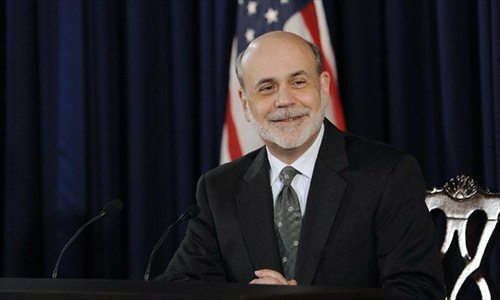China’s monetary policy options squeezed by latest Fed move

The US Federal Reserve's decision to extend bond purchases to stimulate the US economy will put growing inflationary pressure on China and narrow the country's scope to ease its monetary policy, economists warned Thursday.
The US Fed announced Wednesday that it will purchase longer-term US treasury bonds at a monthly rate of $45 billion monthly starting in January, a move aimed at expanding its third-round quantitative easing program, also known as QE3, announced in September.
"The move will further increase liquidity in global markets, mounting liquidity and inflationary pressure and limiting China's room to ease its monetary policy," E Yongjian, a researcher with the Bank of Communications in Shanghai, told the Global Times.
"China's inflation is still controllable in the short term but as the economy is picking up prices are returning to the upward path. The possibility for the country's central bank to cut interest rates to aid the economy is small," E said.
The Consumer Price Index (CPI), a key gauge of inflation, rose 2 percent in November from a year ago, the National Bureau of Statistics said Sunday. The growth rate is a slight rebound from the 33-month low of 1.7 percent in October.
The US Fed decided Wednesday to keep interest rates in a range of 0 to 0.25 percent and anticipates that these exceptionally low rates will be appropriate as long as the unemployment rate remains above 6.5 percent and inflation is projected to be no more than 2.5 percent between one and two years ahead.
In September, the US Fed already announced it would buy $40 billion per month in agency mortgage-backed securities to bolster its economy.
"The US has downgraded the forecast for its economic growth. This increases the risk that the Fed may continue to buy bonds to boost its economy in the future," said Song Guoliang, a finance professor at the University of International Business and Economics.
The US Fed on Wednesday cut its forecast for US economic growth next year, predicting that the US economy may grow 2.3 percent to 3.0 percent in 2013, down from between 2.5 and 3.0 percent projected in September.
The Fed's quantitative easing will put pressure on monetary authorities around the world and prompt them to ease their monetary policies as a countermeasure, Song said.
"Its move will put China in a dilemma and make it weigh up the decision of whether to loosen policy or guard against inflation which may naturally rise as the economy recovers," Song said.
"Unlike the first two rounds of quantitative easing, which directly resulted in an increase of capital in the markets, QE3 and the latest one were structural adjustments of capital, that is, buying long-term bonds while selling short-term ones," Tan Yaling, head of the China Forex Investment Research Institute, told the Global Times.
"Its impact on sentiments in Chinese and other markets is bigger than its actual impact on inflation and liquidity in the markets," Tan said.
In a speech in Beijing on Wednesday, Zhu Guangyao, China's Vice Finance Minister, said the US's first two rounds of quantitative easing flooded hot money into emerging markets, but the impact of QE3 needed to be studied.